UPDATE (10/17/2022):
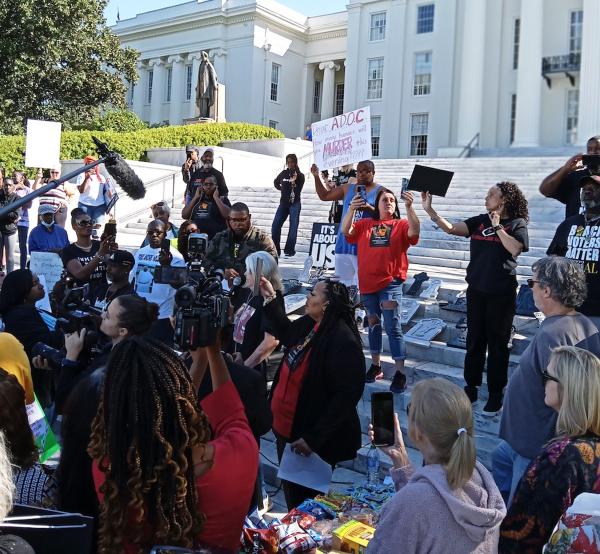
Some 250 people rallied on Friday Oct. 14 at the Alabama State House in Montgomery in support of the Alabama prisoners' strike. People came from Ohio, Texas, New Mexico, Georgia and cities across Alabama including Dothan, Mobile, Huntsville and Birmingham. Many speakers focused their wrath on the Alabama governor, Kay Ivey, renaming her "Poison" Ivey. Copies of the Revolution coverage of the prison strike as well as promotional materials for The RNL Show were distributed through the crowd. Photo: Special to revcom.us
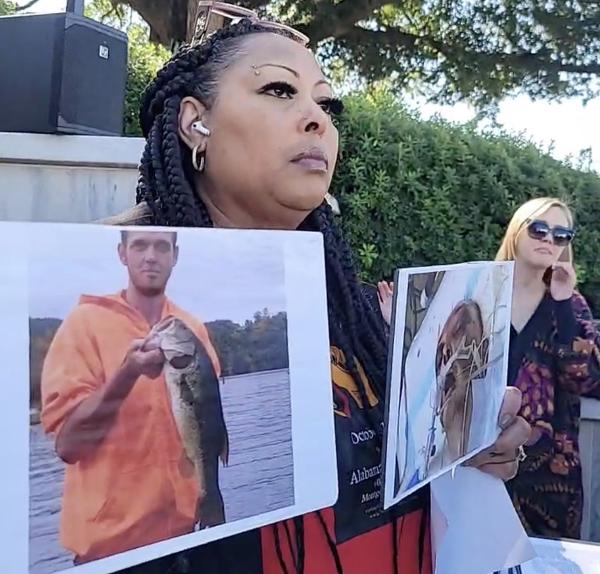
A woman holds “before” and “after” photos of a man beaten to death by guards in an Alabama prison while his mother (not shown) describes the warden literally “pulling the plug” on him in the hospital. Screengrab from video posted by Christina McGee Horvat.
* * * * *
UPDATE (10/10/2022): As we post this, the strike by prisoners in Alabama continues in prisons across the state. Even the authorities, who have been trying to claim the strike is folding, admit several prisons are completely shut down. The prisoners continue to fight to stay strong in the face of every kind of adversity. One of the strike organizers on the inside, Robert Earl Council, known as Kinetic Justice, was beaten and placed in segregation. Other prisoners report threats and violence by the authorities to force them to go back to work. There are depraved mind games from the authorities, like serving one decent, healthy meal out of the blue, and then going back to starvation rations of combinations of bread, uncooked hot dogs, cheese, bologna, prunes and coleslaw. Visitations have been cut off; prison laundries are not operating; trash is piling up; and this on top of already unlivable conditions in the prisons.
The prisoners are setting an heroic example, struggling to rise above the dog-eat-dog degradation imposed by the prison authorities, and the whole nature of this society, which has no future for millions of poor Native American, Latino, and Black people. An article by the prison reform group The Marshall Project on October 8 reported “dozens of men in prisons in other Southern states have begun talking about whether they could replicate Alabama’s work stoppage.”
A line has been drawn. The Alabama prisoners‘ strike is a which-side-are-you-on moment. Statements of “concern” over prison conditions, promises by elected officials or wannabes (Republi-fascist and Democratic), to appoint commissions are worse than meaningless. The prisoners’ demands, focusing on a legitimate and just parole system and an end to death camp conditions must be met, totally, now.
Supporters outside the prison are organizing people to come out for an October 14 rally at 9:00 am at the Alabama State Capitol, 600 Dexter Avenue, Montgomery, Alabama. We encourage readers to go if they can or to find ways to support this struggle, spread the word of it (contact @bothsidesofthewall.com). And to find ways to introduce and challenge people to step into the movement for an actual revolution in whatever ways they can.
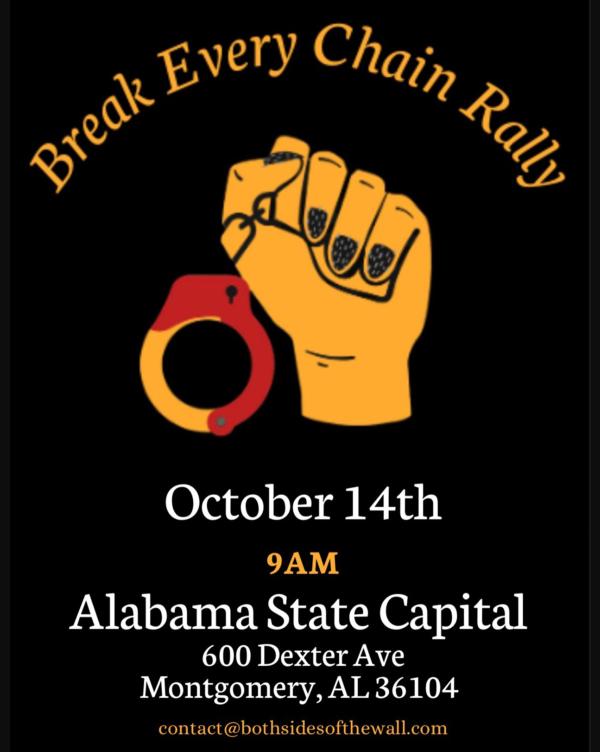
Poster for a Break Every Chain Rally in Alabama.
The heroic sacrifices being made by the prisoners and the ways in which they are confronting the need to transform their outlook point to the significance and weight of a statement by Bob Avakian (BA), the leader of the revolution. That statement is in the book BAsics, which is the handbook for the revolution (available online including as a free download for Android phones). It has particular applicability to this moment, and captures much about the emancipating revolution Bob Avakian is leading and the kind of leader he is.
An Appeal to Those the System Has Cast Off
Here I am speaking not only to prisoners but to those whose life is lived on the desperate edge, whether or not they find some work; to those without work or even homes; to all those the system and its enforcers treat as so much human waste material.
Raise your sights above the degradation and madness, the muck and demoralization, above the individual battle to survive and to “be somebody” on the terms of the imperialists—of fouler, more monstrous criminals than mythology has ever invented or jails ever held. Become a part of the human saviors of humanity: the gravediggers of this system and the bearers of the future communist society.
This is not just talk or an attempt to make poetry here: there are great tasks to be fulfilled, great struggles to be carried out, and yes great sacrifices to be made to accomplish all this. But there is a world to save—and to win—and in that process those the system has counted as nothing can count for a great deal. They represent a great reserve force that must become an active force for the proletarian revolution.
Bob Avakian, BAsics 3:16
* * * * *
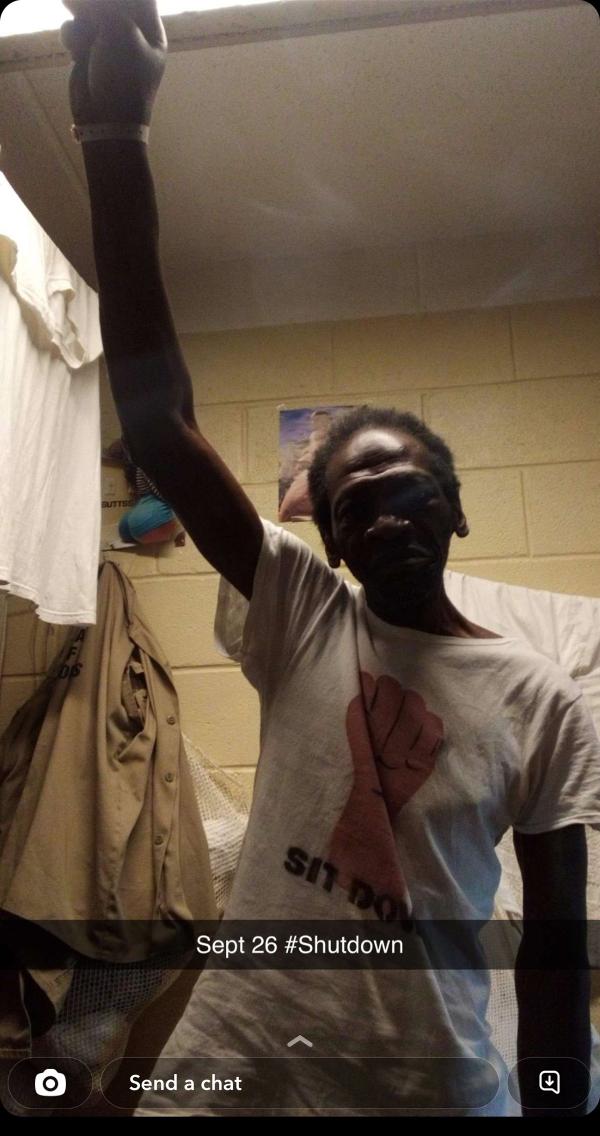
A striking prisoner in the Alabama prison system, photo provided by supporters of the strike.
Thousands of prisoners went on strike against the Alabama prison system on September 26. They are demanding that “The U.S. justice department intervene and put an immediate stop to Alabama’s systematic denial of our human dignity and rights.” In addition, they want an end to “sentencing laws that led to overcrowding, numerous deaths, severe physical injury, as well as mental anguish to incarcerated individuals.” As we post this, the strike continues in the face of vicious moves by prison officials to force them to abandon their struggle.
In coordination with the prisoners’ strike, a network of families and supporters of the prisoners are protesting at the Alabama State Capitol under the slogan “Break All the Chains!” The damning testimony of family members exposing the systematic and barbaric brutality and death suffered by their loved ones has broken through into mainstream news coverage in Alabama and beyond, and shined a light on what is truly a system of genocidal death camps.
The refusal by prisoners in the most depraved, brutal and hellish conditions to accept being treated as less than human beings is a story of powerful, fearless and inspiring courage and determination. (See Revolution interview with Diyawn Caldwell, the president of Both Sides of the Wall, the organization that organized the coordinated protests outside the prisons.) It demands the support of people of conscience everywhere.
Genocidal Death Camps
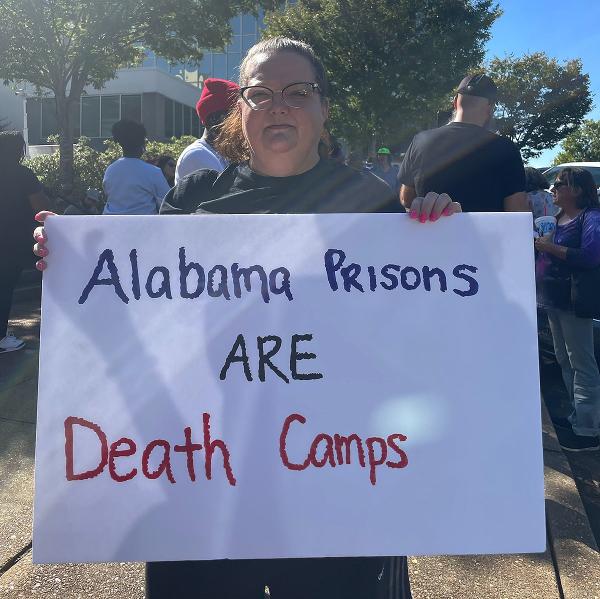
September 2022, Alabama rally for striking prisoners. Courtesy of Diyawn Caldwell
Alabama prisons are body- and soul-crushing death camps, vastly disproportionately aimed at Black people.
Amid a nationwide “war on drugs” (really a war on Black people), Alabama enacted the strictest “three strikes law” in the U.S. This law mandates a life sentence without the possibility of parole for anyone convicted of a Class A felony, including robbery or burglary, if they had any three prior felonies on their record.
As a result, human beings are packed into prisons built to hold half as many people. Photos smuggled out of Alabama prisons document filthy conditions and food unfit for human survival. Prisoners suffer from extreme medical emergencies and are left to die while cries for help are ignored. COVID and extreme heat took an extreme toll in the Alabama prisons without air conditioning. There are no working fire alarms in Alabama prisons, and there are severe plumbing issues, leaky ceilings, and deficient lighting. Insects and other vermin are rampant in the dormitories and kitchen areas, and ventilation and electrical systems are strained due to extreme overcrowding.
About 27 percent of the people in Alabama are Black, but Black people make up 56 percent of those in prison. Black men are three times more likely to be killed than white men in the prisons. And 75 percent of people serving life without parole sentences under Alabama’s “three strikes” law are Black (see Mass Incarceration and Unconstitutional Prisons).
Violence from guards is ferocious and unchecked. The Montgomery Advertiser reported that “Uses of force happen so regularly in Alabama’s prisons that some officers appear accustomed to that level of violence and consider it normal. In short, in Alabama’s prisons, cruel treatment of prisoners by staff is common and de-escalation techniques are regularly ignored.” In 2019, for example, Michael Smith was beaten to death by prison guards. Prison officials told hospital personnel Smith’s injuries occurred after he fell off a bunk bed.
Between guard brutality, a homicide rate resulting from the hellish conditions people are pushed into, and abysmal medical care, being sentenced to an Alabama prison amounts to being sent to a death camp. In just the 30 days from June 15 to July 15 of this year, for example, 11 men incarcerated at Donaldson Correctional Facility near Bessemer, Alabama died. The majority of these deaths involved younger men who, according to family members, did not suffer preexisting health conditions apart from injuries sustained during assaults at the prison. In several cases, family members were not even notified about their loved one’s death or were unable to get information about what happened to them.

September 2022, Alabama rally for striking prisoners. Courtesy of Diyawn Caldwell
Sadistic, Systematic Denial of Parole
The Alabama Board of Pardons and Paroles (BOPP) received 4,232 requests for parole in the year ending September 30, 2021. Had it followed its own guidelines, 3,216 would have been released on parole. But the BOPP is not required to follow even its own guidelines. It released only 648 prisoners.
While the rate of denial of parole is barbaric for all prisoners, there is a huge racial disparity in who gets parole. From June to December of 2021, 23 percent of white inmates considered for parole were released but only 9 percent of Black inmates.
Diyawn Caldwell, the president of Both Sides of the Wall, told Revolution that this creates a situation where the perception among prisoners is that “you got more people coming out in body bags than on parole.”
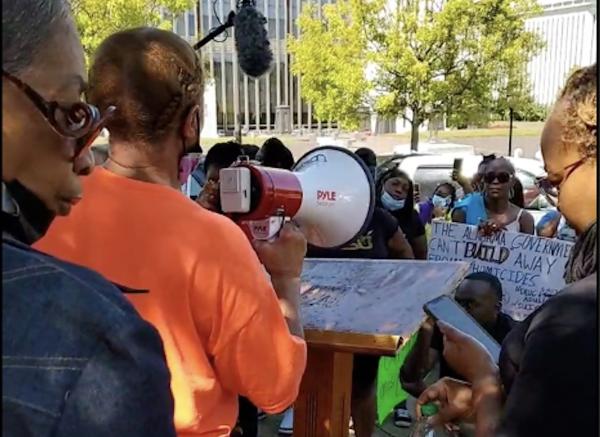
September 26, 2022: A woman whose brother was one of three inmates to die from medical neglect in the last two months at the Bibb “Correctional Facility” speaks at a "Break All the Chains" rally outside the Alabama State House in Montgomery.
State-Imposed Culture of Violence Used to Demonize Prisoners
The U.S. “Justice” Department (DOJ) released a report in 2019 that characterized conditions in Alabama prisons as “severe, systemic” violation of prisoners’ constitutional protection from cruel and unusual punishment. That much is true. But the report, focusing narrowly on prisoner-on-prisoner violence, concluded what was needed was more death camps and more guards. It downplayed evidence that emerged in its own investigation that the policies and culture imposed by prison authorities play the main role in creating and enforcing this situation.
In one incident, buried in the DOJ report, a prisoner reported trying to get protection from being threatened with rape. He was told by authorities that because he owed a debt for drugs, he had to pay it off with sex. The report documented (and essentially ignored) 17 similar incidents. And prison authorities instigate inmate-on-inmate violence by mixing victims of assault in the same pens as those they fear assault from.
This system-induced violence in the prisons is used by the Alabama state government to perpetrate racist demonization of prisoners in an attempt to isolate them, in service of a whole fascist agenda with genocide a cutting edge. In response to the prisoners’ published demands for an end to policies that condemn almost all prisoners, regardless of their sentences or prison records, to what is essentially life without parole, a spokesperson for Alabama Governor Kay Ivey released a statement falsely claiming, “Some of these demands suggest that criminals like murderers and serial child sex offenders can walk the streets” and declaring, “I can tell you that will never happen in the state of Alabama.”
Heroic Sacrifice and Struggle
In addition to the lockdown, prison authorities are literally trying to starve the prison population into submission. Food rations, already miserable previously, have been cut from three to two “meals” a day consisting of things like two slices of white bread with a piece of bologna or cheese on them. One man incarcerated at Ventress Correctional Facility told the Montgomery Advertiser that he heard a captain in the prison tell correctional officers, “If they don’t want to work, starve them.” There are no provisions for diabetic prisoners or prisoners with severe food allergies.
There are also reports that prisoners who have documented abuses and violent attempts by the authorities to break the strike are being put in solitary confinement.
In the face of all the ways in which the prison system creates and intensifies conflict among prisoners, they have forged inspiring unity. One prison rights activist reported, “Just spoke with a man serving in an Alabama prison. He’s adamant that everyone, all the gangs, are working together and won’t stop the strike until there’s change. ‘We just needed hope, and this gives us hope.’”
10/1/2022: In the face of extremely difficult hardships and dangerously deteriorating conditions, striking Alabama prisoners demonstrate unity by linking arms. Video provided to revcom.us by supporters of the prisoners.
On day 5 of the strike, a prisoner sent word that “We are staying strong... We know that we have nothing else to do and this gives us hope and shows everyone that we can work together as a team to get things accomplished.”
The courage and determination of the prisoners, and the changes they are going through, provide a glimpse of the potential impact of those for whom this system has no future. In "An Appeal to Those the System Has Cast Off," Bob Avakian (BA) has written that “there is a world to save—and to win—and in that process those the system has counted as nothing can count for a great deal.” The challenge before those both inside and outside the prison walls is to connect that potential with BA’s emancipating leadership and work, while also building support for important struggles like the one now raging in Alabama.